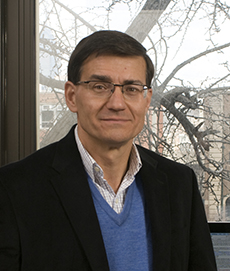Pedro Ponte Castañeda Elected ASME Fellow
 Pedro Ponte Castañeda, Raymond S. Markowitz Faculty Fellow and Professor in the Department of Mechanical Engineering and Applied Mechanics, has been elected a Fellow of ASME. The ASME Committee of Past Presidents confers the Fellow grade of membership on worthy candidates to recognize their outstanding engineering achievements.
Pedro Ponte Castañeda, Raymond S. Markowitz Faculty Fellow and Professor in the Department of Mechanical Engineering and Applied Mechanics, has been elected a Fellow of ASME. The ASME Committee of Past Presidents confers the Fellow grade of membership on worthy candidates to recognize their outstanding engineering achievements.
Ponte’s research is in the area of heterogeneous material systems, including composites, polycrystalline aggregates and particulate flows. In the area of composite materials, he addresses nonlinear constitutive and kinematical effects as observed in low-temperature plasticity and high-temperature creep of metal-matrix composites, as well as in the large-deformation behavior of black-filled and porous elastomers. His group is also concerned with the theoretical development of constitutive models for porous metals, accounting for the evolution of the microstructure, which will be useful in assessing the effect of porosity on localization instabilities with applications to ductile failure and manufacturing processes. He is developing constitutive models for low-symmetry polycrystals, and also working on the numerical implementation of these models in constitutive subroutines. In addition, Ponte’s group is developing structure-property relations for thermoplastic elastomers (TPEs) and semi-crystalline polymers (SCP). These are multiphase polymeric materials consisting of a phase (e.g., polybutadiene) giving rise to the rubbery nature of the materials, and a crystalline or glassy phase (e.g., polystyrene, or polypropylene) yielding increased stiffness and enhanced large-deformation properties. TPEs and SCPs exhibit structure at two different length scales and there is growing experimental evidence that this dual structure greatly affects the overall response of macroscopic samples. Most recently, Ponte’s group has been developing constitutive models for magneto-and electro-elastic materials capable of undergoing large strains and investigating possible applications as active materials, including “artificial muscles,” as well as investigating the non-Newtonian rheology of dispersions of soft elastic particle in viscous fluids.
ASME helps the global engineering community develop solutions to real world challenges. Founded in 1880 as the American Society of Mechanical Engineers, ASME is a not-for-profit professional organization that enables collaboration, knowledge sharing and skill development across all engineering disciplines, while promoting the vital role of the engineer in society. ASME codes and standards, publications, conferences, continuing education and professional development programs provide a foundation for advancing technical knowledge and a safer world.
To learn more about Dr. Ponte and his research, visit his faculty profile.
